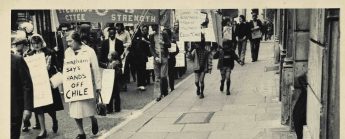Sarah Mass is a PhD candidate in history at the University of Michigan. Her dissertation examines the trajectory of market halls and market places in British cities from the interwar period through the 1970s, focusing on the role they played in definitions of retailer and consumer citizenship, the built environment, and public ownership and heritage. She is on Twitter at @smass35
Last week, a story came across my Twitter feed that cut all too close to home. The article detailed the newest plank in the Tory initiative to cut down on “visa fraud” from non-EU international students: http://www.theguardian.com/uk-news/2015/jul/13/work-restrictions-foreign-students-visa-fraud-crackdown.*
While this may appear only tangentially related to the professional challenges we discussed at MBS2015, I couldn’t help but connect its ramifications to our discussions around graduate students’ invisible “work.” Here is my line of thinking, and some points for consideration going forward.
One of the key takeaways of MBS2015 was that innovation in British studies comes from interjecting broad historical developments and with attention to the specific and concrete. Many papers’ methodology reflected this ethos:
Adam Page used Belfast community newspapers to elucidate issues around the state and social housing; Christine Grandy maximized her access to the MACE archive to explain media interpretation of “difference” in postcolonial Britain; Daisy Payling used oral history in Sheffield to materialize the stakes for social activists in the 1980s.
This extended to the plenary lectures, where there were glimpses of polyvalent archives. Whether it was Seth Koven’s use of the Hobhouse papers, or Stephen Brooke’s references to how his time in 1980s London shaped his GLC project, the audience was aware that the “big history” traditionally tackled in plenaries were nevertheless undergirded by time in a tangible research “place.”
While recognizing the contribution of these papers on a content level, I would like to question who is included in this sustained empirical work. Which graduate students have the resources to truly embrace this methodology? Non-UK-based graduate students face practical challenges when we strive to back up our knowledge of the “macro” with new forays into the “micro.” The policing of international borders referenced above is one such obstacle in our academic trajectories.
In many ways, access to traditionally “macro” sources in the US is better than ever: parliamentary, newspaper, and film databases — along with the ever-handy ILL — means that there is a wealth of material accessible from Ann Arbor to Walla Walla.
Yet in my experience, the sustained archival research that forms the backbone of “micro histories” is becoming a privilege rather than a right for British historians based in American universities. The recent international student visa restrictions remind us that in addition to teaching or time-to-degree pressures, we face supra-higher education challenges. Even with funding, how do we present ourselves at the UK border when our dissertation work is largely “invisible?”
Prior to leaving for my UK archival research, I was told, “never mention the ‘w’ word at immigration.” As graduate students, we inadvertently talk about our research as work: “I’m working at the National Archives,” etc. However, presenting yourself as a “worker” without a UK sponsor (the case for many North Americans supported solely by their home institutions) sets off alarm bells at border control.
At minimum, we should have clear research plans, letters of introduction, and the bank account statements, proof of health insurance, and pre-purchased return flight that show we will never become a burden on the state. In other words, we must appear with the resources and certainty of a contract worker, even if our status garners us none of the privileges.
This performative ritual belies a research schedule marked by impromptu movement, all in the name of piecing together our personal archive. During my stay in the UK, I discovered one of my critical (yet unlisted) sources by opening a non-digitized bound volume held uniquely in St Pancras. This lead took me on to local record offices, regional film archives, and most obscurely, a car boot sale in Bathgate (no joke). Some of my eight months went according to plan, others were unanticipated.
This journey was a form of flexible work: it is a no-go subject at border control, and a prohibitive luxury for many dissertating graduate students who enter the UK. I recognize that my status as a PhD student at an elite university comes with enormous financial privilege, and I was able to complete most of my archival research in my allotted visit. That said, even the most generous American funding falls short of the freedom and status only guaranteed by an academic visitor visa.
It follows that the six-month “tourist” status, which many North Americans use to structure their time in the UK, hinders MBS’s call for more recognition, inclusivity, and security for graduate students. Dissertation projects change, yet with each return trip our passports become more suspicious.
Return trips cost money: it is more cost effective to securely move within the UK rather than back and forth between home institution and research site.
Finally, the six-month rule reflects the privilege of PhD students from a subsection of global higher education: pre-application hurdles hamper many international students who would contribute to our dialogue on modern Britain.
There is no immediate solution to the predicament of non-EU graduate students working in UK archives. I am firmly behind the “Beyond Birmingham” objective in the MBS aims: it would facilitate extra-dissertation-research engagement with UK universities, and the piece of mind that our temporary residency is secure.


One thought on “Sarah Mass: Who is Afforded (and who can Afford) the Archive?”